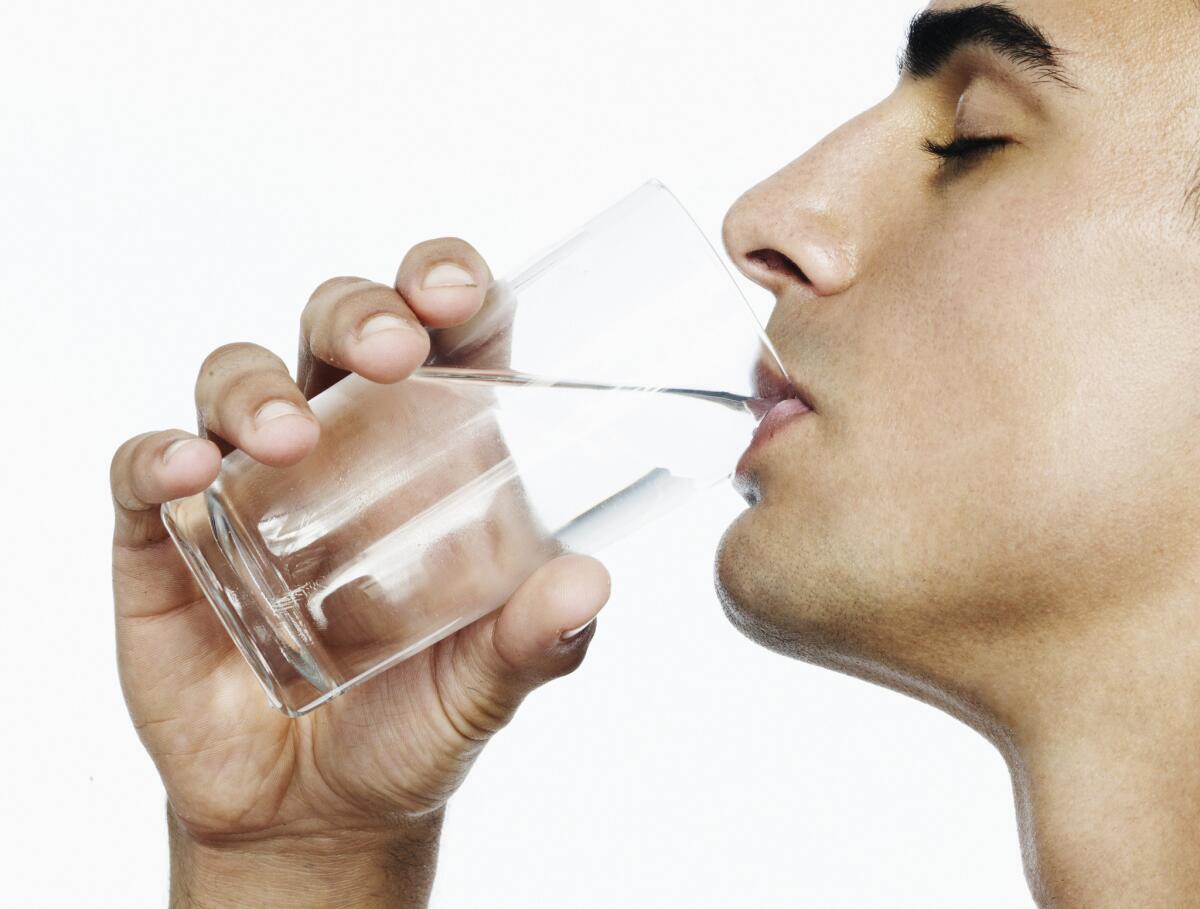Five tips to get a jump on your weight-loss resolution

Portrait of man drinking a glass of water.
- Share via
We’re betting you’ve already “treated yourself” a little too much this holiday season — hey, who can resist that extra reindeer cookie?
Pretty much no one.
But here’s some good news. You can get a jump on your resolution to drop a few pounds in 2016 — and it won’t be hard at all. New research shows that easy lifestyle moves can reap significant weight-loss benefits.
Five tips to consider:
1. Eat more often. Researchers at Occidental College here in Los Angeles recently found that consuming six healthy, portion-controlled meals per day instead of three slightly larger meals helped slash hunger pangs and produced a leaner physique during weight loss. (Note the two important words: “portion-controlled.”) The study compared participants who ate twice a day, about six to seven hours apart, and subjects who ate smaller meals every two to three hours The conclusion? “Increased [meal frequency] may lead to reduced consumption at subsequent meals and/or overall daily caloric intake,” according to the study.
2. Drink a glass of water (or two). Drinking a little more than two cups of water (or 500 milliliters) before each meal can help spur considerable weight loss. Researchers at the University of Birmingham in Britain, led by Dr. Helen M. Parretti asked overweight study subjects to drink up, then imagine themselves with a full stomach before starting to eat a normal-sized meal. The result of this creative visualization? On average, subjects lost 9 1/2 pounds each over a 12-week period.
3. Reach for the chile pepper. Researchers at the University of Adelaide in Australia found that capsaicin, a compound found in chile peppers, sends messages to the nerve network in your stomach, which then tells your brain you’re no longer hungry. “One of the reasons obese people eat more food is probably due to disruption of this hot chile receptor in nerves in the stomach,” says Amanda J. Page, assistant professor and senior research fellow at the university’s School of Medicine. “If we can discover how this channel is disrupted then we can develop a drug therapy for the treatment of obesity that will not only help you lose weight but also keep the weight off. It’s a ‘watch this space’ situation. Scientists are working on the problem, and eventually there will be a successful therapy.” In the meantime, if you enjoy spicy food, try a half teaspoon daily half-teaspoon of red pepper sprinkled over one meal each day: Previous research by Purdue University found that doing so increased study subjects’ core body temperature, caused them to burn more calories and curbed hunger.
MORE: Get our best stories in your Facebook feed >>
4. Test drive a new app. One in five Americans use technology to track their health progress in one way or another. American Heart Assn. research recently found that using a mobile app with user-friendly assistance in recording food intake and personalized feedback may successfully help users keep off weight and meet individual goals for at least a year. According to lead study author Lora E. Burke, a professor of nursing at the University of Pittsburgh, smartphone apps and wearable sensors can inspire progress when it comes to increasing physical activity and practicing healthy behaviors that can curb high cholesterol, high blood pressure and diabetes. You just have to find one you like — and then actually use it.
5. Spin before dinner. If you are planning to treat yourself to a fried-food fest, jump on your bike for just eight minutes first — not only will it help you burn calories, it will protect your heart. Researchers at the University of Exeter in the United Kingdom found that a brief shot of high-intensity cycling protected healthy study subjects from blood vessel function changes that occur within hours after a high-fat meal — protecting them from stroke and heart disease, not just weight gain. “When we eat a high-fat meal, we increase the amount of fat we burn in our cells,” explains study author Alan Barker. “Exercise increases the blood flow through our blood vessels, which is likely to increase in nitric oxide and can overcome the negative influence of the high-fat meal.”
Of course, none of these tips gives license to eat as much junk as you want.
“I would not recommend readers to eat high-fat or high-sugar meals,” Barker said. “After we eat a meal, the fat and sugar contained within the food is broken down and enters the blood stream. How well our body is able to process this fat and sugar is linked to our future risk of disease.”
ALSO:
Are you a nail biter? A hair twister? Or always late? 4 tips for breaking bad habits
How to improve willpower? Feed it.
It doesn’t have to hurt: How to use soft rollers and balls to gently melt away aches and pains






